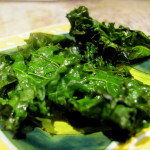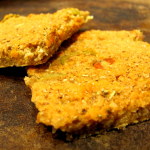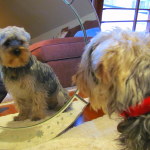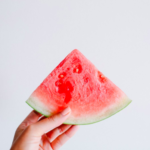
Rosalind Franklin: She might have been left out of the Nobel, but at least she gets the honoured spot as the featured image of this post. Lucky her. (Sorry, readers, just a little inside joke for the molecular biologists out there). Image source: wikipedia.org
“Do you find yourself easily able to bounce back from emotionally-charged situations?” Dr. Emily Fitzgerald, ND, asked while sitting across from me at her white desk. “The fact that this part of the gene is present and not deleted means that you are the ‘cool and collected’ type, the ‘Wolf of Wall Street’, if you will.” She went on, “We find here through our testing that most naturopathic doctors have the other version of this gene.”
Great, I thought, I was genetically unfit to practice naturopathic medicine; it was like something out of the movie GATTACA. I couldn’t help but feel let down by my genetic coding. I had always thought of myself as an empathetic and caring person and yet science was telling me the opposite. Wolf of Wall Street? Seriously? I hated the movie. In fact, I felt more at home sharing a collective vegan lunch with protesters occupying Wall Street than bidding on stock options. Surely this doctor must be mistaken. But alas, it wasn’t her fault. She was simply a messenger, reading out to me what was clearly spelt out in my nucleic acid.
Genes are funny things. We inherit one set from our mothers and another from our fathers. They don’t change throughout our lives and they are responsible for coding all of the proteins, enzymatic reactions and cellular structures that make up our beautiful bodies. However, I once read that interpreting the human body through genetic code is analogous to interpreting Shakespeare’s works by studying the alphabet; it’s not even a recipe, but a mere grocery list.
Dr. Mohammed, the CEO of YouNique Genomics, a Canadian lifestyle genomics company, will also assert that “genes aren’t everything.” Our environment has a lot to do with how they are expressed and this simple fact can explain why, despite the fact that I am missing part of the “emotional gene”, I am still able to regard my patients with positivity, appreciate literature and cry at sappy love stories.
Despite the Nature vs. Nuture debate, there is still a lot that can be garnered from looking at genetic coding. By studying my expression of SNPs (single nucleotide polymorphisms), or small variations in DNA, on only 14 of my 23,000 genes, Dr. Fitzgerald was able to tell me that I am a passionate person, I am capable of regulating my emotions when confronted with difficult situations, I can drink espressos after dinner without affecting my sleep and the Paleo Diet will only lead me to overeat. She told me how dopamine is metabolised in my brain, how my liver detoxifies and how my body digests cholesterol and lipids, giving me information about my long-term risk for heart disease. And she did all of this without looking at her crystal ball, not even once.
I previously associated genetic testing with detecting the risk for diseases such as early-onset Alzeimer’s or breast cancer. I had always thought that knowing one’s genetics was dis-empowering. After all, you’re born with your genetic code; what is the use of learning about something that you can’t change? It seemed to me as useful as tying yourself to a set of train tracks, powerless to stop yourself from being crushed under the freighter speeding towards you.
My mind changed when I learned about functional genomic testing like the kind offered at YouNique. Functional, or lifestyle, genomics don’t predict disease risk but rather only test for genes whose expression can be affected by lifestyle. The test I received was called the SNaP Shot. It looks at 14 genes, including those that code for dopamine metabolism, liver detoxification, methylation pathways and cardiovascular health.
One of the noteworthy pieces of information I learned was that my detoxification pathways are like a leaky faucet with a clogged drain. The enzymes that run Phase I liver detoxification, which make many toxins more toxic, are over-expressed, meaning that they work better than the average person’s. However, I have less than optimal Phase II detoxification, which is responsible for neutralizing these toxins and allowing them to be safely eliminated from the body. This means that I need to start supporting my liver and increasing my production of glutathione, an important antioxidant. If I don’t do this? It’s written in my DNA, and perhaps that stars, that my risk of cancer from toxin exposure could be higher than normal. I bought a bottle of milk thistle the next day.
I also learned that my body has a 30% reduced ability to use folate, meaning that I need to increase my intake of this vitamin or else risk problems with inflammation, which has wide-spread affects. I also found out that I respond poorly to saturated fat intake: it makes me hungrier by stimulating ghrelin, the appetite hormone, and can lead to weight-gain if my diet is uncontrolled. This is relevant in the natural health world because the Paleo Diet involves eating a diet high in saturated fats to achieve the exact opposite aim: controlling hunger. Genetic testing is the future!
What was the immediate result of the information I received by donating a vial of blood and an hour’s consultation time to YouNique? I learned that I need to support my liver (hence the milk thistle) and increase my folate intake. The truth of my long-term disease risk is there, written in my genome, which won’t change, that much is true. What I hadn’t considered, however, is our power to rewrite the future, by using naturopathic medicine to work with the building blocks we inherit. Our genes will always be the same but what we learn about how they are expressed will continuously evolve. Genomic testing, as Dr. Mohammed pointed out, is a living and breathing test. With the same test results, our treatment plans can evolve as our knowledge in the area grows. The more science learns about how lifestyle affects our genes, the more we can work with what we’ve got.
To end off, Dr. Mohammed told me a story in which he was examining a rather unfavourable genetic report before meeting the patient it belonged to, a naturopathic practitioner. When the ND entered the room, Dr. Mohammed was taken aback. Surely this healthy, spry, attractive individual was not the same person whose genes indicated an increased risk of obesity, inflammation, toxic exposure and heart disease? However, this individual had chosen to “walk the talk”, as we say in the field, and live his life in a healthy and holistic way. And, by doing so, he was able to change the course of his own personal health history; a great novel whose prologue began being written moments after his conception but whose conclusion he will be able to co-write. Shakespeare was given the alphabet. We are given a crazy combination of four nucleotides. Shakespeare wrote Hamlet. Through lifestyle genomics, I’ve come to realize that what we write with the information we’re given just might be up to us.
To learn more about lifestyle genomic testing and how it can help you affect your own health, contact me.






